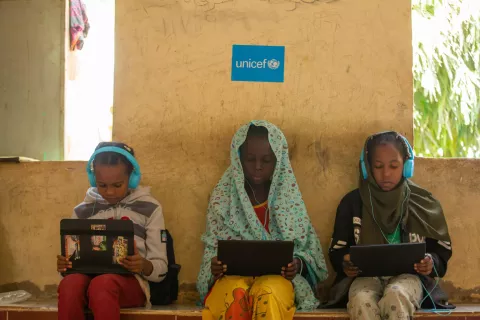West and Central Africa Region Appeal
Humanitarian Action for Children
UNICEF’s Humanitarian Action for Children appeal helps support the agency’s work as it provides conflict- and disaster-affected children with access to water, sanitation, nutrition, education, health and protection services. Return to main appeal page.
Appeal highlights
- In 2024, due to the consequences of protracted and acute conflicts, population movements, recurrent and simultaneous public health emergencies, climate change-related disasters and food and nutrition crises, 48.4 million children living in West and Central Africa will continue to require multisectoral assistance to uphold their rights and meet critical needs in nutrition, health, water, sanitation and hygiene, child protection, education and social protection.
- UNICEF will support governments, public and private institutions and civil society partners to improve emergency preparedness and response to humanitarian crises, including by strengthening systems and promoting community resilience.
- In this regional appeal, UNICEF is requesting $52.5 million to reach 5 million out of 6 million children with humanitarian needs in nine countries: the Republic of the Congo, Equatorial Guinea, the Gambia, Guinea, Guinea-Bissau, Liberia, Mauritania, Senegal and Sierra Leone. An additional eight countries with large-scale emergencies are presenting standalone appeals, and four Gulf of Guinea coastal countries are grouped into a multi-country appeal.
- This regional appeal also includes the UNICEF West and Central Africa Regional Office support to all 24 countries in the region for multisectoral emergency preparedness and response.

Key statistics
6.9 million people in need of health assistance
3.4 million people in need of nutrition assistance
832,000 children in need of protection services
4.3 million out-of-school children
1.3 million people lacking access to safe water
Funding requirements for 2024
Regional needs and strategy
 Humanitarian needs
Humanitarian needs
In the entire West and Central Africa region, 48.4 million children require humanitarian assistance due to conflicts, population movements, recurrent and simultaneous public health emergencies, food and nutrition crises and climate change-related disasters. More than 17.2 million people are displaced, with numbers rising steadily as hostilities continue. By the end of 2023, 6.2 million children under 5 years of age will be at risk of severe wasting, more than 31 million people will have an urgent need for water, sanitation and hygiene (WASH) assistance and 2.5 million children will be affected by the closure of nearly 13,263 schools. Social protection coverage is limited – only 9 per cent of people have access to social assistance.
In the nine countries covered by this appeal, low vaccination coverage (which in some countries decreased further during the COVID-19 pandemic) is among the many reasons for concurrent outbreaks of measles, polio, Ebola virus disease, Lassa fever, Marburg virus disease and diphtheria. In 2024, more than 3.6 million children under 5 years of age will require polio, pentavalent and measles vaccination.
Food insecurity and malnutrition remain widespread. In 2024, 1.4 million children will suffer from wasting in the countries included in this appeal. Climatic shocks, including recurrent droughts and floods, will also affect several countries, often causing internal displacement or cross-border migration. And armed conflict triggers displacement into countries covered by this appeal, including Mauritania, which currently hosts nearly 86,000 refugees from neighbouring Mali.
The region is experiencing growing civil unrest and political instability. Strikes by government workers and violent demonstrations in several countries, including Guinea-Bissau, Liberia and Senegal, have led to disruptions in access to essential services (including education, health and nutrition care, social services and referrals to social welfare, justice and mental health and psychosocial support). This poses challenges to the right of youth to participation and to their meaningful engagement in decision-making. Overlapping shocks are increasing the risks of exploitation (in the form of child labour), child marriage, migration (including that of unaccompanied and separated children) and gender-based violence, with a disproportionate burden on adolescent girls.
 UNICEF’s strategy
UNICEF’s strategy
In line with the UNICEF Strategic Plan, 2022–2025 and the Core Commitments for Children in Humanitarian Action, the humanitarian strategy of the West and Central Africa Regional Office is built around ensuring gender-sensitive emergency preparedness and response to humanitarian crises. It also seeks opportunities to strengthen national and local capacities, systems and services and build community resilience. With a growing adolescent population in the region, the need for age- and gender-specific services is essential for ensuring that the region’s demographic dividend – the economic benefit that can accrue by having an increase in working-age population relative to the rest of the population – does not turn into a demographic crisis.
In 2024, the West and Central Africa Regional Office will provide multisectoral technical support to the country offices in the region for implementing humanitarian preparedness and response programmes, renewing partnerships and engaging in inter-agency collaboration.
The Regional Office will promote humanitarian–development–peace nexus approaches to reduce risks and vulnerabilities. This will help to improve people’s resilience and underpin the sustainability of the impacts of humanitarian programmes; the nexus approach will also improve coordination, coherence and complementarity.
Other priorities include localization of humanitarian action (empowering and strengthening the capacity and resources of local organizations to lead humanitarian responses and deliver aid in their areas), accountability to affected populations and strengthened protection from sexual exploitation and abuse.
The regional office will support preparedness and contingency plans along with timely monitoring, the generation and management of information on humanitarian situations and the increased use of smart technology for forecasting and risk analysis.
Anticipatory action, pre-positioning of supplies and early deployment of human resources to support emergency responses will also be part of UNICEF's humanitarian strategic approach in West and Central Africa.
Find out more about UNICEF's work
Highlights
Humanitarian Action is at the core of UNICEF’s mandate to realize the rights of every child. This edition of Humanitarian Action for Children – UNICEF’s annual humanitarian fundraising appeal – describes the ongoing crises affecting children in West and Central Africa; the strategies that we are using to respond to these situations; and the donor support that is essential in this response.





